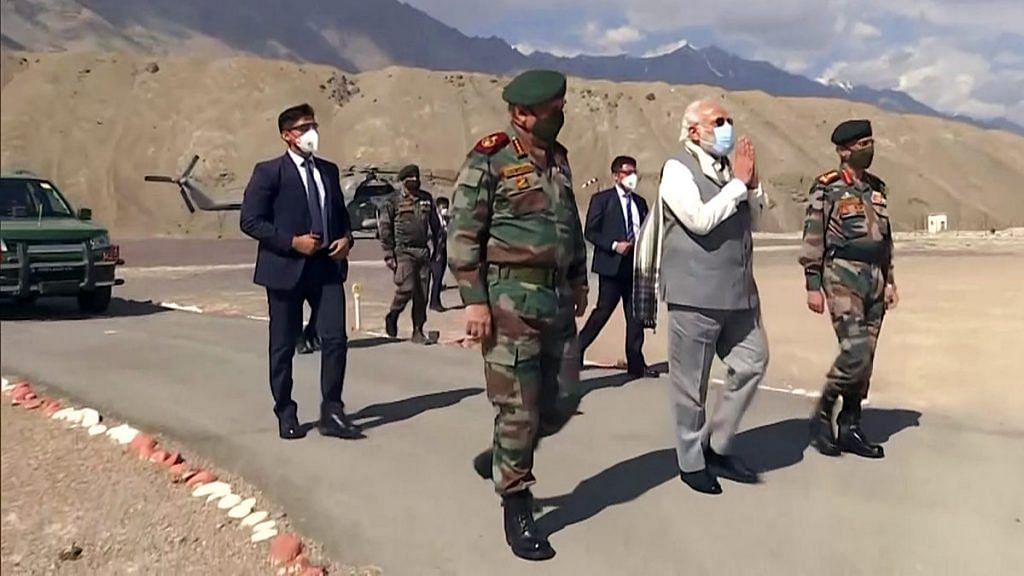New Delhi: A ‘Statement on China’ signed by 144 armed forces veterans has highlighted the urgent need for a revamp of India’s intelligence system, in the context of the Galwan Valley clash on 15 June that killed 20 Indian soldiers.
The statement, sent to President Ram Nath Kovind, Prime Minister Narendra Modi, Defence Minister Rajnath Singh, Chief of Defence Staff Gen. Bipin Rawat and the three service chiefs on 2 July, said the Galwan incident could only have happened because of failure at one or more levels in the political, civil and military establishments, especially in continuous intelligence acquisition and dissemination.
“While we accept that failures can happen in any system, in the current instance, either our intelligence system was found wanting, or the intelligence which was obtained did not reach the field units in time,” the veterans stated. “We therefore urge that our nation’s intelligence system be urgently revamped.”
Air Marshal K.C. ‘Nanda’ Cariappa (retd), one of the signatories to the statement, told ThePrint that it was the brainchild of former Navy chief Admiral L. Ramdas (retd).
“I went through the letter and we signed it out of our love for the armed forces and the country,” Cariappa said.
The Galwan incident, Cariappa added, has seen a lot of “twisting of facts”, prompting the veterans to come out with the statement.
‘Nanda’ Cariappa is the son of Field Marshal K. M. Cariappa, the first Indian chief of the Indian Army, and was a prisoner of war in Pakistan in the 1965 war.
Also read: India, China corps commanders to meet next week, will focus on next round of disengagement
Communication gap
The veterans’ statement also highlighted the communication gap from the government and the military during the stand-off with China at the Line of Actual Control in Ladakh, and said a formal statement should have been issued by either soon after the Galwan clash, which would have put rumours and guesswork to rest.
“It would have prevented China from taking advantage of contradictions between ambiguous or inaccurate verbal statements needing later clarifications,” the veterans stated, adding that in the event of such future situations, only formal statements be issued to ensure that the Indian public is not confused and the “aggressor nation” does not gain political advantage.
The statement further read that a fact-finding body needs to be immediately instituted regarding the “intrusions, incursions and encroachments by China” in Aksai Chin (Depsang, Galwan, Pangong Tso etc.), and elsewhere along India’s long border with it.
“We request that the report of this fact-finding body be tabled in the Lok Sabha with time-bound framework,” it said.
Also read: India, China look to build on Doval-Wang dialogue, eye ‘long-term settlement plan’ for LAC
National policy and strategy
The veterans went on to say that India urgently needs a national policy and strategy on neighbourhood management, featuring all of India’s immediate and more distant neighbours, especially China and Pakistan.
“Formulation of such national policy and strategy has been neglected by successive governments,” they said.
This should be immediately initiated to safely guide India’s political, military, bureaucratic and diplomatic establishments towards “stable relations with our neighbours, small and large, friendly or inimical”.
“Having an overarching national policy and strategy will reduce casualties among our troops, which occurred due to the heightened risk of being reactive to conflict situations created by China or Pakistan,” the veterans said.
Report on 1962 war be made public
The statement also sought the release of the Henderson Brooks-Bhagat report on the 1962 India-China war into public domain, so that the “military-bureaucratic-political system and the public can learn from the mistakes of the past”.
“We urge that the government should take very early steps towards concluding boundary agreements with all our neighbours, but especially China and Pakistan, by employing all available diplomatic means and pressures, together with the power of India’s membership position for 2021-22 in the UN Security Council,” it said.
“This does not in any manner imply reduction in deployment of our armed forces or let up in our intelligence systems, but it will enable us to better attend to development for our people within our country,” it added.
The veterans’ statement also said proactive steps should be taken to use non-electoral political tools of consultation, discussion and negotiation to resolve all domestic disputes and situations, instead of coercion and force. This, it said, would strengthen the nation’s integrity and resolve to face any and all aggressive designs by inimical and aggressive neighbours.
“These steps will enable state and central governments to devote more attention and resources towards development of our people within our country,” it said.
Also read: How India lined up US, Russia on its side of LAC and China was forced to return friendless
